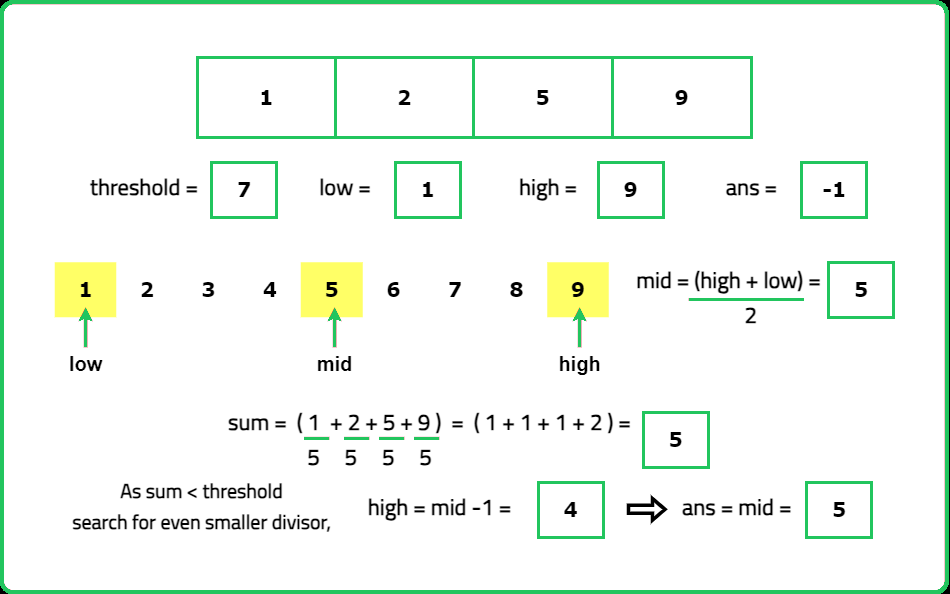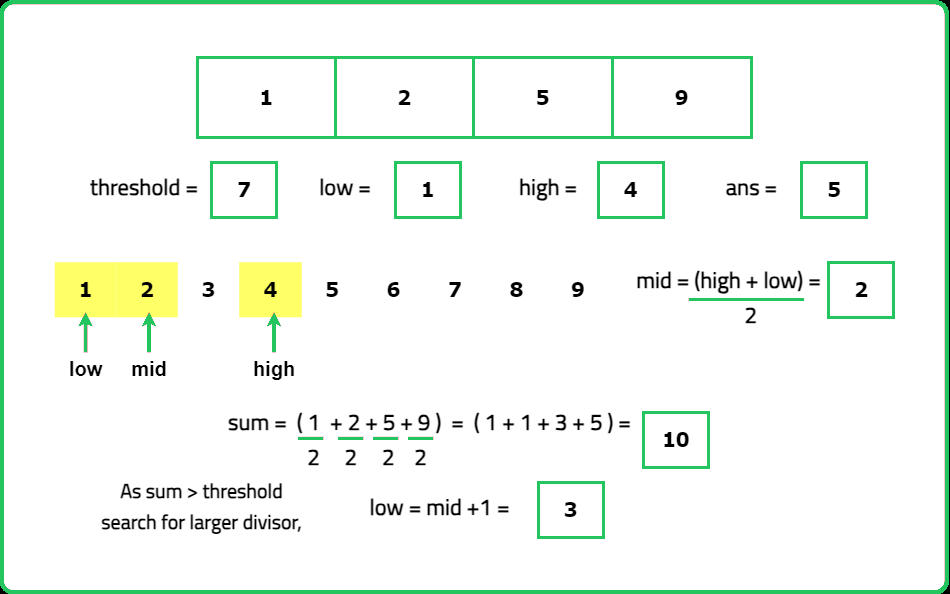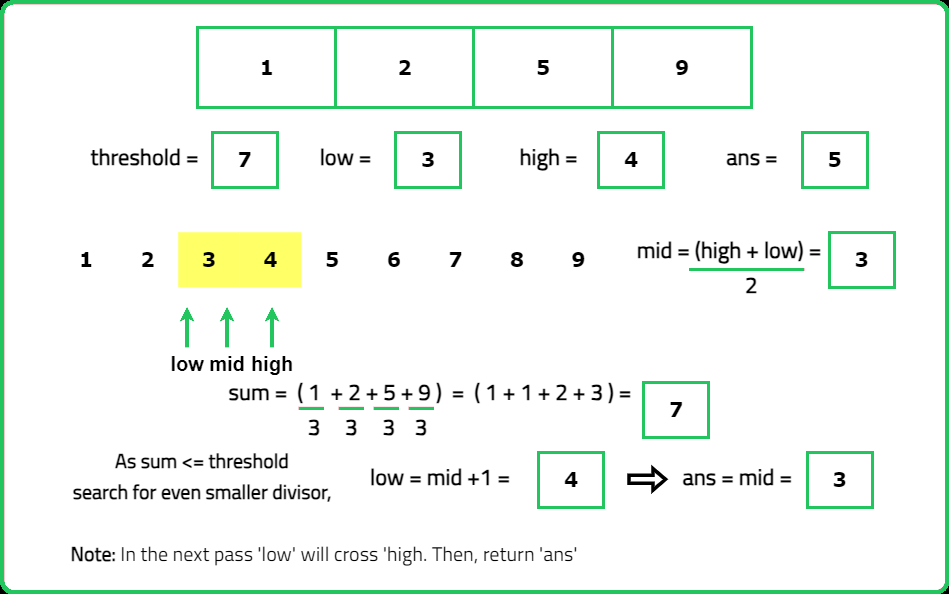1234567891011121314151617181920212223242526272829303132333435363738394041424344454647484950515253545556
#include <bits/stdc++.h>
using namespace std;
class Solution {
private:
/* Helper function to find the
summation of division values*/
int sumByD(vector<int>& nums, int limit) {
// Size of array
int n = nums.size();
// Find the summation of division values
int sum = 0;
for (int i = 0; i < n; i++) {
sum += ceil((double)(nums[i]) / (double)(limit));
}
return sum;
}
public:
// Function to find the smallest divisor
int smallestDivisor(vector<int>& nums, int limit) {
int n = nums.size();
if (n > limit) return -1;
// Initialize binary search bounds
int low = 1, high = *max_element(nums.begin(), nums.end());
// Apply binary search
while (low <= high) {
int mid = (low + high) / 2;
if (sumByD(nums, mid) <= limit) {
high = mid - 1;
} else {
low = mid + 1;
}
}
return low;
}
};
int main() {
vector<int> nums = {1, 2, 3, 4, 5};
int limit = 8;
// Create an object of the Solution class
Solution sol;
int ans = sol.smallestDivisor(nums, limit);
// Print the result
cout << "The minimum divisor is: " << ans << "\n";
return 0;
}
1234567891011121314151617181920212223242526272829303132333435363738394041424344454647484950515253545556
import java.util.Arrays;
class Solution {
/* Helper unction to find the
summation of division values */
private int sumByD(int[] nums, int limit) {
// Size of array
int n = nums.length;
// Find the summation of division values
int sum = 0;
for (int i = 0; i < n; i++) {
sum += Math.ceil((double)nums[i] / (double)limit);
}
return sum;
}
// Function to find the smallest divisor
public int smallestDivisor(int[] nums, int limit) {
int n = nums.length;
if (n > limit) return -1;
//Find the maximum element:
int maxi = Integer.MIN_VALUE;
for (int i = 0; i < n; i++) {
maxi = Math.max(maxi, nums[i]);
}
int low = 1, high = maxi;
// Apply binary search
while (low <= high) {
int mid = (low + high) / 2;
if (sumByD(nums, mid) <= limit) {
high = mid - 1;
} else {
low = mid + 1;
}
}
return low;
}
public static void main(String[] args) {
int[] nums = {1, 2, 3, 4, 5};
int limit = 8;
// Create an object of the Solution class
Solution sol = new Solution();
int ans = sol.smallestDivisor(nums, limit);
// Print the result
System.out.println("The minimum divisor is: " + ans);
}
}
1234567891011121314151617181920212223242526272829303132333435363738394041424344454647
import math
class Solution:
""" Helper function to find the
summation of division values"""
def sumByD(self, nums, limit):
# Size of array
n = len(nums)
# Find the summation of division values
sum_val = 0
for num in nums:
sum_val += math.ceil(num / limit)
return sum_val
# Function to find the smallest divisor
def smallestDivisor(self, nums, limit):
n = len(nums)
if n > limit:
return -1
# Initialize binary search bounds
low = 1
high = max(nums)
# Apply binary search
while low <= high:
mid = (low + high) // 2
if self.sumByD(nums, mid) <= limit:
high = mid - 1
else:
low = mid + 1
#Return the answer
return low
if __name__ == "__main__":
nums = [1, 2, 3, 4, 5]
limit = 8
# Create an object of the Solution class
sol = Solution()
ans = sol.smallestDivisor(nums, limit)
# Print the result
print(f"The minimum divisor is: {ans}")
123456789101112131415161718192021222324252627282930313233343536373839404142434445464748495051
class Solution {
/* Helper function to find the
summation of division values*/
sumByD(nums, limit) {
// Size of array
const n = nums.length;
// Find the summation of division values
let sum = 0;
for (let i = 0; i < n; i++) {
sum += Math.ceil(nums[i] / limit);
}
return sum;
}
// Function to find the smallest divisor
smallestDivisor(nums, limit) {
const n = nums.length;
if (n > limit) return -1;
// Initialize binary search bounds
let low = 1, high = Math.max(...nums);
// Apply binary search
while (low <= high) {
let mid = Math.floor((low + high) / 2);
if (this.sumByD(nums, mid) <= limit) {
high = mid - 1;
} else {
low = mid + 1;
}
}
//Return the answer
return low;
}
}
function main() {
const nums = [1, 2, 3, 4, 5];
const limit = 8;
// Create an object of the Solution class
const sol = new Solution();
const ans = sol.smallestDivisor(nums, limit);
// Print the result
console.log(`The minimum divisor is: ${ans}`);
}
main();


